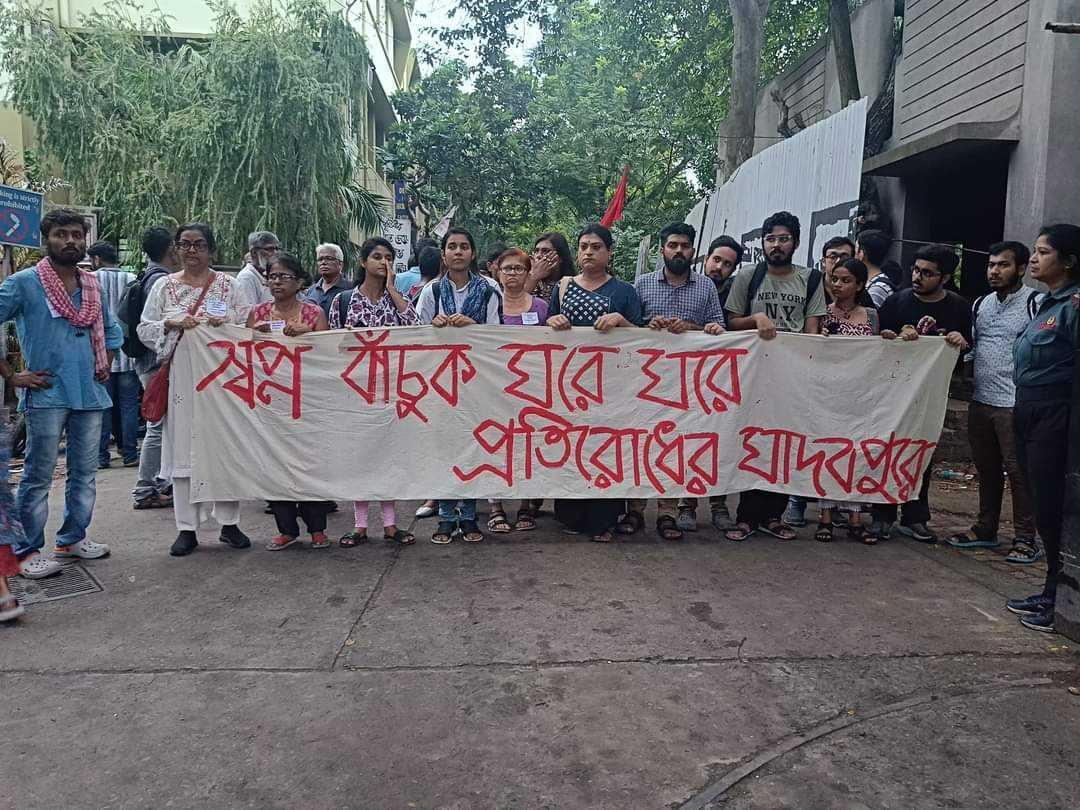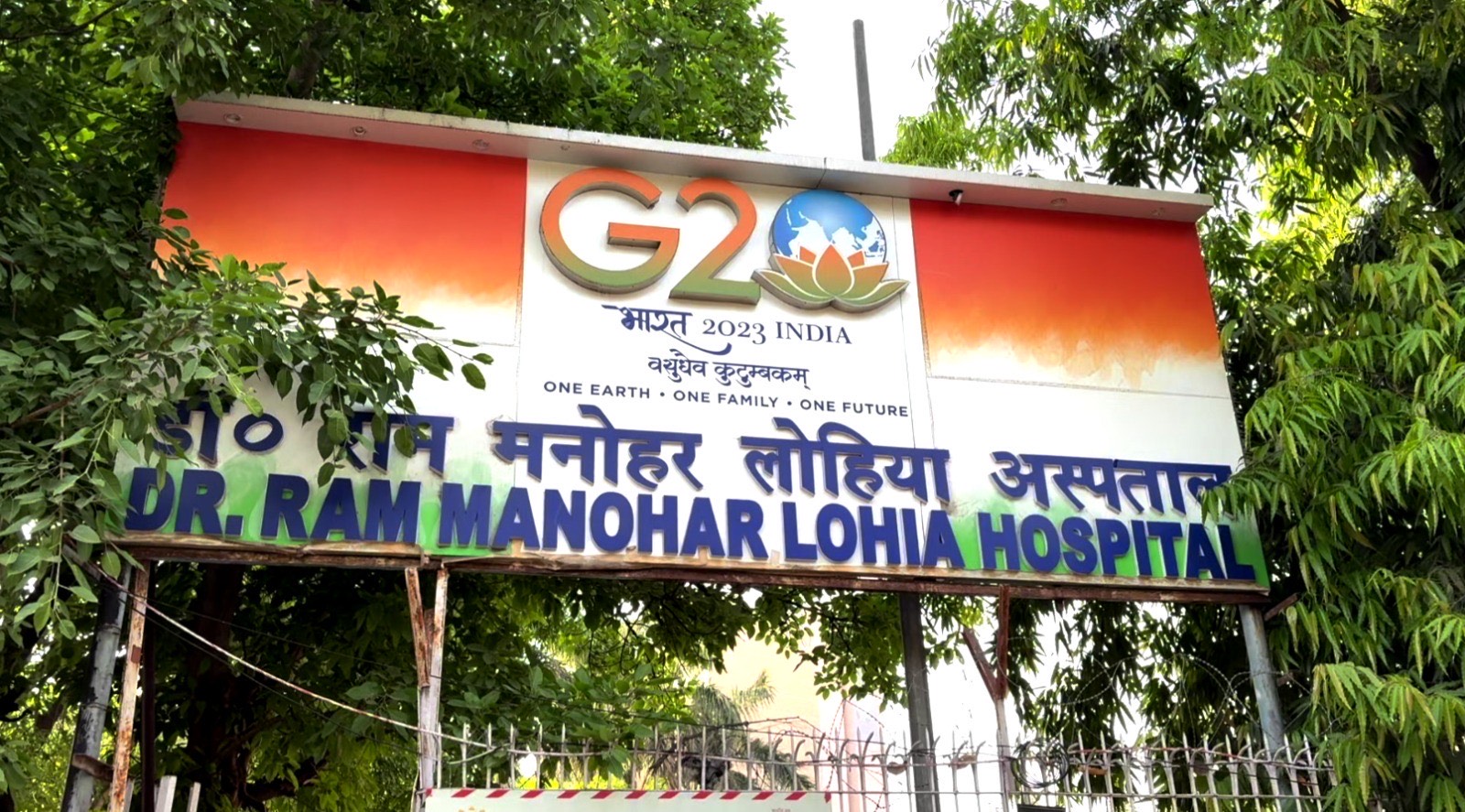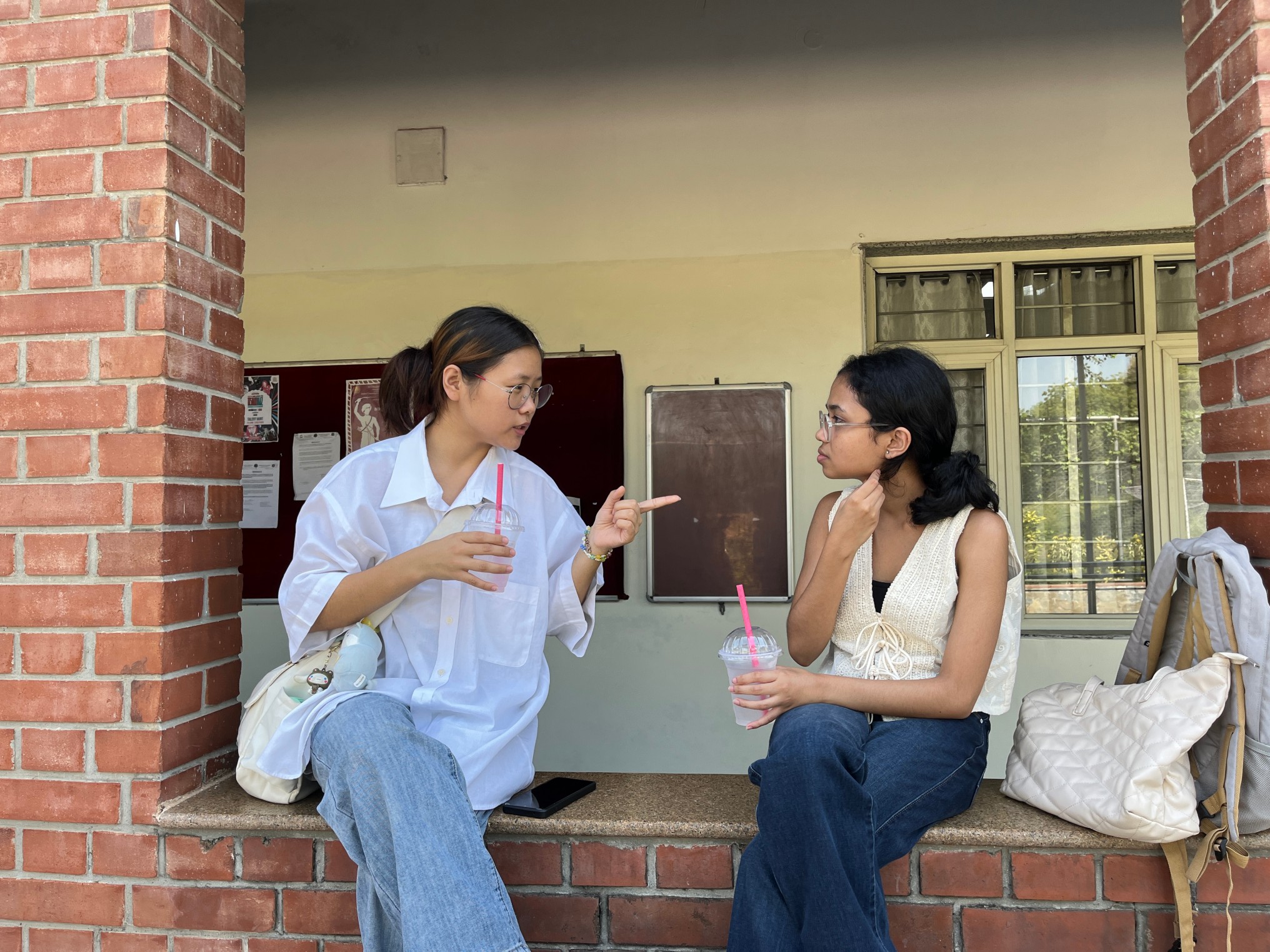After the death of a first-year Bengali honours student by suicide on 9th August at the Jadavpur University boys’ hostel premises, an internal fact-finding committee has investigated the ragging and sexual harassment that allegedly caused the death of the student.
According to the report of the committee, thirteen individuals arrested in connection with the incident, including four students of Jadavpur University, have been barred from entering the university premises or the campus. Furthermore, they have been prohibited from participating in any academic activities until they are cleared of the charges.
According to an official spokesperson from the University, the initial decision to bar the entry of more than thirty senior students who were accused of aiding and abetting the ragging and sexual harassment of the first-year student into the boys’ hostel has been rescinded.
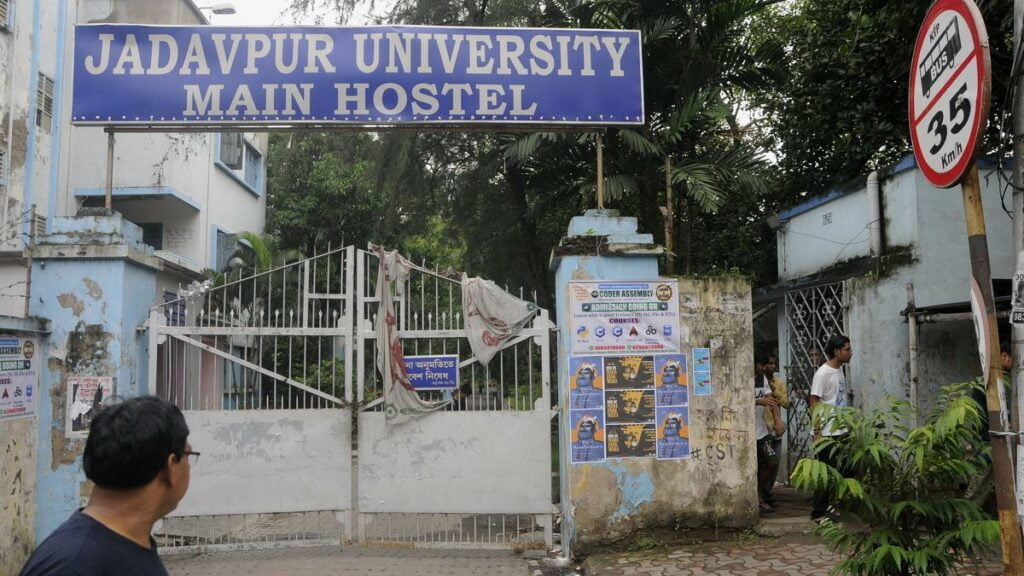
In light of the situation, several students who joined the institution in the latest academic year are reluctant to take up residence in the Jadavpur University hostels and would prefer to look for PG or rental accommodations outside the University. The ragging incident has also led to a massive public outrage against the prestigious University which is now being vilified as ‘Antankpur,’ (land of terror) by West Bengal CM Mamata Banerjee.
The newly appointed Vice Chancellor of the University, who is associated with the right-wing Hindutva organisation RSS, has enabled a calculated crackdown on JU students by allowing the installation of CCTV cameras on campus which students claim is a ‘manifestation of the right-wing surveillance state.’ The fact that the CCTV installation is being funded from the academic budget comes as no surprise since UGC and CAS (Centre for Advanced Studies) funding has diminished over the years, despite JU consistently occupying high positions in national and international University ranking lists.
Moreover, after the Jadavpur University ragging case and the death of the first-year student, students alleged that the media has been continuously harassing them to grow their TRP. The unrestricted entry of media personnel from channels like RBangla and Zee 24 Ghanta into campus premises has led to students being chased, harassed and filmed without consent.
However, there has been no effort by the authorities to address the social issues of ragging and queerphobic bullying that led to the student’s death. Instead, as a first-year student at the Department of English claims, ‘There has been a conscious and calculated effort to malign the University and its students by painting the ragging case as something that only happens in JU and nowhere else.’
Ragging is a social issue not only JU-specific
Earlier this year, the death by suicide of an IIT Bombay student, Darshan Solanki, pointed to the toxic and casteist ragging culture prevalent in IITs. However, this incident was not seen as an IIT-specific issue, even though IITs have always had a history of caste discrimination. But, the ragging case in the JU hostel which led to the death by suicide of the first-year student was portrayed as a JU-specific issue that according to the quintessential Bengali bhodrolok society, ‘exposed the horrible, immoral and deviant culture of Jadavpur University.‘
It is important to note that Jadavpur University has been the hub of leftist political activism in Kolkata, much like JNU in Delhi. Being a progressive and liberal University space where students and teachers conversed freely on diverse topics, Jadavpur University had often incurred the ire of the genteel and conservative Bengali due to the culture of ‘andolan,’ (activism) and ‘sexual anarchy.’
In 2014, JU hundreds of students of Jadavpur University marched from the university campus to Jadavpur Police Station to protest against moral policing in the Kolkata edition of the ‘Kiss of Love’ protest. Often, JU, on account of being a public University, had invited allegations of drug abuse on campus. This has led to the construction of a negative narrative by the public imagination around Jadavpur University.
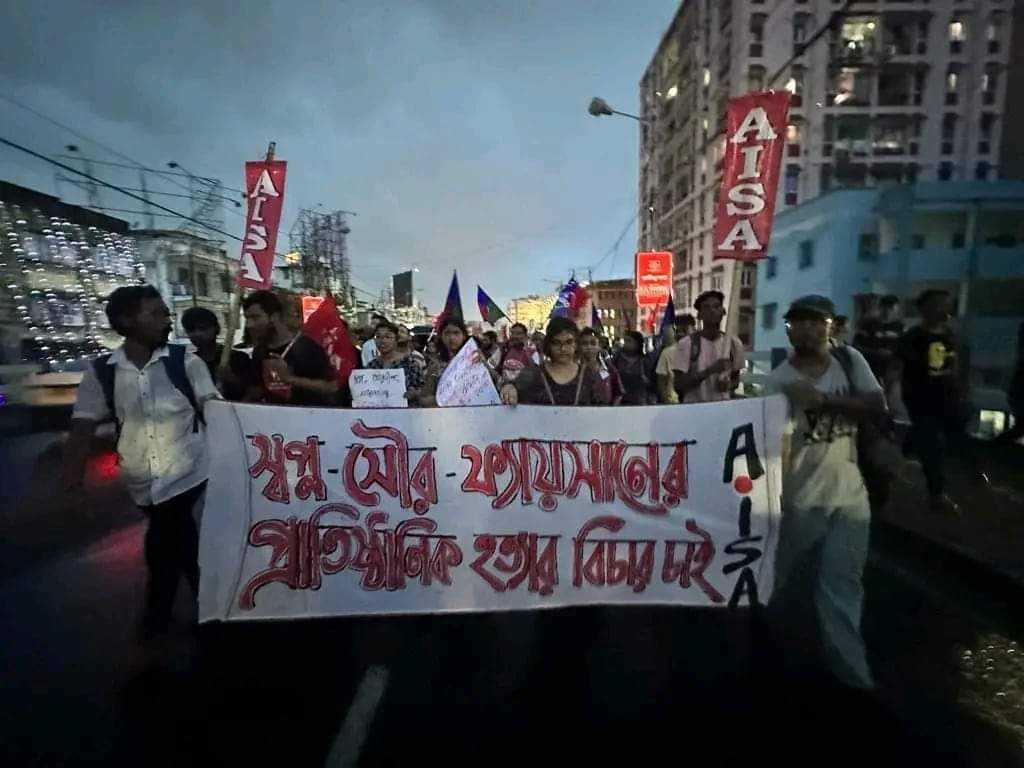
However, JU’s consistently high position in NRF rankings has provided the public with little opportunity to criticise the University till now. ‘The ragging case was a loophole for the public who claim to preserve morality and the status quo to vilify Jadavpur University as a cesspool of toxicity, anarchy and sin,’ alleges an undergraduate student of the University.
Another student relates how he was harassed on a public bus by a middle-aged man who found out that he was a student at JU.
‘Right from the media representatives chasing students on their way to class and filming them unethically to random people in public spaces abusing us, JU students, most of whom were not associated with the ragging that happened on hostel premises in any way, are being systematically targeted and villainised,‘ claimed a first-year student. She further alleged that the authorities have done nothing to address this issue and ensure a peaceful and healthy campus experience sans ragging and bullying.
Furthermore, the fact that the JU students are actively protesting against the toxic ragging culture in academic spaces through continuous sit-in demonstrations, rallies and all-stakeholder general body meetings is not being mentioned by mainstream news channels. ‘By ensuring the erasure of this active protest movement by the students of JU against ragging, the media is painting us as complicit in the ragging case, even as we are vehemently opposed through such a toxic culture,’ says a student protester.
Why is queerphobia eliminated from the JU ragging case?
It is clear from screenshots of messages and first-person accounts that are being circulated on social media, that the ragging case was a blatantly queerphobic one. The victim was taunted for being ‘gay,’ asked to prove his masculinity and was sexually abused by the seniors in the hostel. Eye-witness accounts at the site of the suicide claim that the victim was repeating the words ‘I am not gay,’ as he jumped from the hostel balcony to his death.
‘Nobody will acknowledge the elephant in the room which is queerphobia. If this case is depicted as a case of queerphobic bullying, it would not garner as much TRP for news channels. Anti-JU narratives sell, recognising queerphobia does not,’ says a student of Comparative Literature from the queer community.
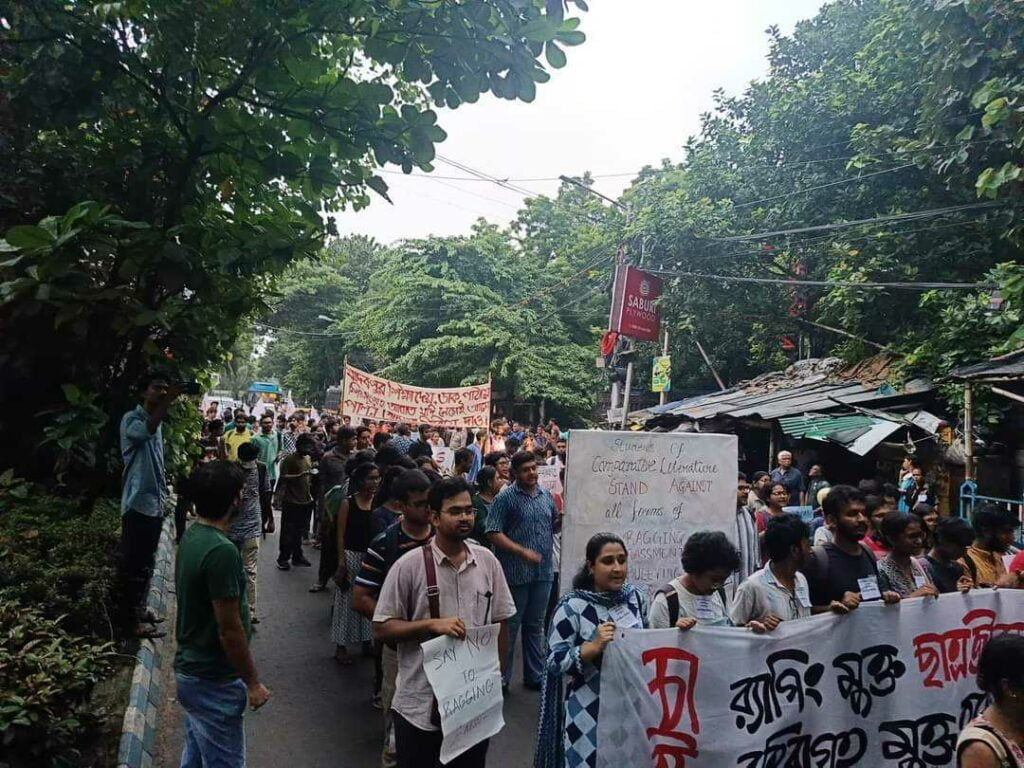
The fact that on 17th August, while protesting the ragging case and the ensuing vilification of JU, a trans student named Urmi was brutally beaten up by BJP and ABVP goons who came to JU to incite violence after the ragging case, points to the overarching culture of queerphobia and toxic masculinity prevalent in our society.
When Urmi’s friends attempted to seek justice for her at the Jadavpur Police Station, they faced transphobic ridicule and jeers from the police. This incident proves yet again how the patriarchal culture of queerphobia is maintained and preserved by the keepers of the state.
Misplaced retribution and no solution in the JU ragging case
The installation of CCTV cameras on campus, according to the students, will fail to solve the issue of bullying at hand. ‘Most of the ragging takes place in the enclosed space of the hostel rooms where the installation of CCTV cameras is not possible. The bullies would not dare to do what they did in the hostel in any other space on the campus. Therefore, installing CCTVs on the campus is useless and just a ploy to impose surveillance on students,’ a post-graduate JU student tells FII.
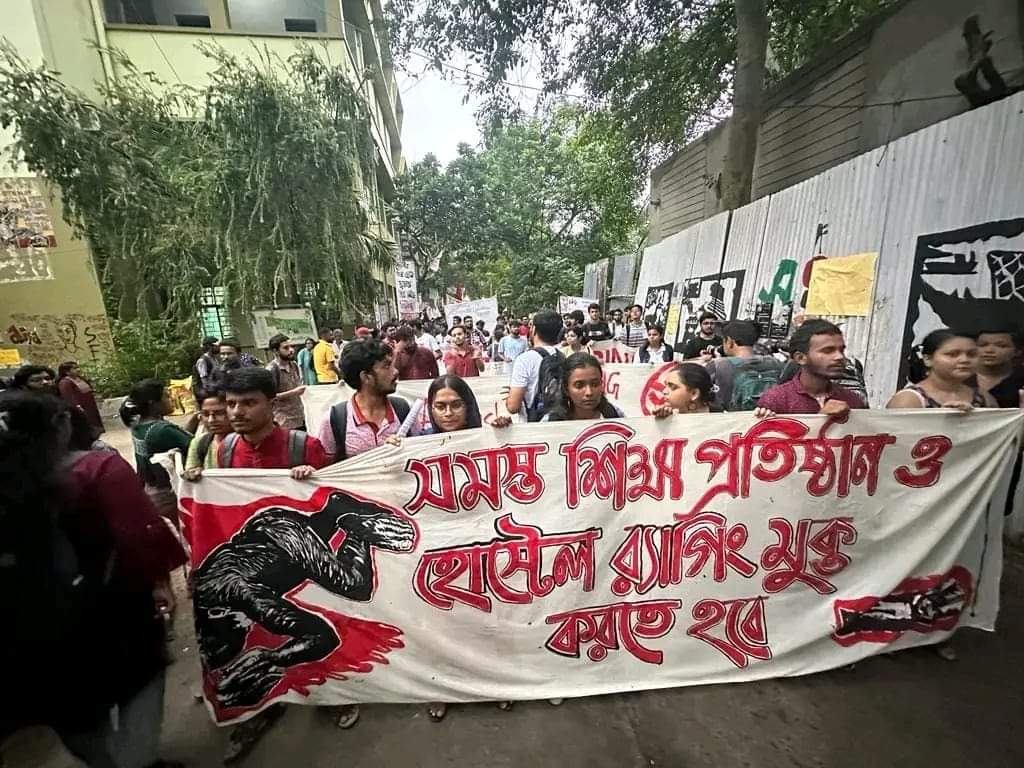
Instead of creating awareness and sensitising students against ragging and bullying, the authorities are carrying out a project which is effectively useless. The fact that an anti-ragging student committee was randomly selected by the authorities and not elected by the student body, reasserts the claim that the authorities are inept at bringing about justice for victims of ragging.
Therefore, there has effectively been no positive resolution of the ragging case in JU, owing to the lack of active initiative by the authorities, the non-recognition of the queerphobic undertones of the case and a refusal to acknowledge and address ragging as a social issue and not an isolated JU-specific case.
names of the students are withheld for safety and security reasons
About the author(s)
Ananya Ray has completed her Masters in English from Jadavpur University, Kolkata, India. A published poet, intersectional activist and academic author, she has a keen interest in gender, politics and Postcolonialism.
